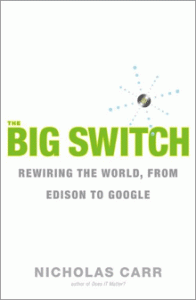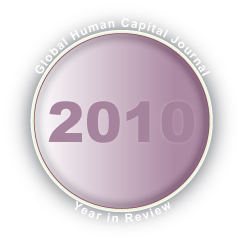Curmudgeonly Looking into the Past to Divine the Future—That Nagging Privacy Issue—Debunking the Elephant
 The Big Switch is a valuable book that reflects what has become Nick Carr’s trademark role, heckling IT and Web enthusiasts, albeit from good seats. Carr seems to relish his role as “the fly in the ointment” of the idealistic IT-enabled world that Web missionaries espouse. Although this book has shortcomings, I recommend it for two reasons. First, Carr makes a convincing and useful argument that the “electrification” of business and society (the Edison part) has valuable lessons for the “computerization” transformation of business and society (the Google part) that is currently unfolding. This parallel provides context to think about some of the disruptions around your business, society and career. Second, Carr raises serious questions about possible privacy implications of computerization. He palpably weighs in on the dark side and seems to want the world to change course from the “googlization of life.” If you haven’t read The Long Tail, I would read these books in proximity because they are very complementary and both quick, important reads. The Big Switch is a valuable book that reflects what has become Nick Carr’s trademark role, heckling IT and Web enthusiasts, albeit from good seats. Carr seems to relish his role as “the fly in the ointment” of the idealistic IT-enabled world that Web missionaries espouse. Although this book has shortcomings, I recommend it for two reasons. First, Carr makes a convincing and useful argument that the “electrification” of business and society (the Edison part) has valuable lessons for the “computerization” transformation of business and society (the Google part) that is currently unfolding. This parallel provides context to think about some of the disruptions around your business, society and career. Second, Carr raises serious questions about possible privacy implications of computerization. He palpably weighs in on the dark side and seems to want the world to change course from the “googlization of life.” If you haven’t read The Long Tail, I would read these books in proximity because they are very complementary and both quick, important reads.
As […]
Web 3.0 and Social Business—2011 Predictions and Recommendations describes a turning point, away from social media to social business. SocialTech Grows Up—Relationship the Foundation of Business Success—Digital Clodhoppers Become Sore Thumbs.
 2011 will mark a turning point in the adoption of digital social technologies because the experimentation phase is drawing to a close, and stakeholder expectations are increasing. Organizations and people will no longer gain attention by executing badly. At the enterprise level, participation will wane in venues and initiatives that have no business strategy, focus, content strategy and commitment. Paying inexperienced people or agencies to “share” snappy content will expose brands as digital clodhoppers and push customers away. Individuals will also have to improve their game and focus on the most relevant people in their networks. Stop sending default invitations on LinkedIn. Proactively support people whom you respect and trust the most. The theme is determining and executing on strategy, focus and commitment. 2011 will mark a turning point in the adoption of digital social technologies because the experimentation phase is drawing to a close, and stakeholder expectations are increasing. Organizations and people will no longer gain attention by executing badly. At the enterprise level, participation will wane in venues and initiatives that have no business strategy, focus, content strategy and commitment. Paying inexperienced people or agencies to “share” snappy content will expose brands as digital clodhoppers and push customers away. Individuals will also have to improve their game and focus on the most relevant people in their networks. Stop sending default invitations on LinkedIn. Proactively support people whom you respect and trust the most. The theme is determining and executing on strategy, focus and commitment.
In 2011, the bar to attract and hold attention will be higher, which will present organizations with a new threat: when participation falls, some executives will conclude that […]
2010 Year In Review Initial Glimmers of Social Business is the Editor’s Choice of the Global Human Capital Journal—The Best Strategy, Tactics, Case Studies and Insights of 2010
 Compared to its progenitors 2009 and 2008, 2010 was a relatively calm year because the amplitude of market gyrations was clearly less, and businesses began to find a new floor on which to build stakeholder expectations. Although I watched with high interest the unfolding drama in Europe, I didn’t have the time to conduct the research necessary to do a rigorous interpretation. I did publish a reflection in January, which is not included in this year in review. However, 2010 marked a major turning point in the adoption of social technologies: the recognition that analysis and strategy were necessary to achieve consistent results with social initiatives. Compared to its progenitors 2009 and 2008, 2010 was a relatively calm year because the amplitude of market gyrations was clearly less, and businesses began to find a new floor on which to build stakeholder expectations. Although I watched with high interest the unfolding drama in Europe, I didn’t have the time to conduct the research necessary to do a rigorous interpretation. I did publish a reflection in January, which is not included in this year in review. However, 2010 marked a major turning point in the adoption of social technologies: the recognition that analysis and strategy were necessary to achieve consistent results with social initiatives.
2010 Macro trends
Social has been in adolescence up through 2009-2010 in which “being on Facebook” was an end in itself, agencies produced vapid content and little interaction happened because people won’t interact when brands are talking at them and not listening. People feel it when a […]
At first, it seemed that the machine had tilted, its levers, bells and flippers having hit some kind of glitch, causing us to lose the ball and the bonus points.
 As the curtain rises on the second decade of the twenty-first century, we will see that the machine is actually fine, but it’s become a different game. Quite entirely. To put it mildly, “the economy” is proving to be quite a drama, its pungence largely dependent on where your company or career is wired into it. Although it is quite frowned upon in the U.S. to admit despair, some pundits have even flirted with the moniker, “The Great Recession” to describe the crisis, a faint nod to the Great Depression of the 1930s, but this comparison is off-base. As I have argued for some time, the 2007-2010 “financial crisis” has played a mere overture to the real story, a transformation of the global “economic architecture.” I first heard this deft phrase from His Excellency Shri Kamal Nath, India’s very diplomatic Minister of Commerce in 2008 (coverage here). As the curtain rises on the second decade of the twenty-first century, we will see that the machine is actually fine, but it’s become a different game. Quite entirely. To put it mildly, “the economy” is proving to be quite a drama, its pungence largely dependent on where your company or career is wired into it. Although it is quite frowned upon in the U.S. to admit despair, some pundits have even flirted with the moniker, “The Great Recession” to describe the crisis, a faint nod to the Great Depression of the 1930s, but this comparison is off-base. As I have argued for some time, the 2007-2010 “financial crisis” has played a mere overture to the real story, a transformation of the global “economic architecture.” I first heard this deft phrase from His Excellency Shri Kamal Nath, India’s very diplomatic Minister of Commerce in 2008 (coverage here).
[…]
In the knowledge economy, people are motivated by greater autonomy, mastery, and purpose—not by carrots or sticks.. connectivity is second only to a water pump in its significance to a village.. It will not be enough, as it was back in the early Web, to just leave a website lying around to be found. Business has to become a travelling exhibit, a movable market stall that can be adjusted and placed wherever people are or want to be.. Marketers have begun to view social networks as a significant marketing contact point (and perhaps even more important than traditional channels) for procuring consumer data and knowledge.. people are diving into the Web 2.0 and 3.0 pools before they even know with whom they are swimming.. In 2010 we will see more public agencies taking risks to engage in this sort of “flat” information sharing and insight gathering.. sociology will rapidly become the new economics. […]
2010 Predictions and recommendations for enterprise social networking and Web 2.0: how executives and enterprises can leverage social business to increase competitiveness. Understand how social networks are contributing to the end of the Industrial Economy: the importance of blogs, Twitter, Facebook, LinkedIn, YouTube, MySpace and focusing on relationships. […]
Review and Analysis of the twenty-first century’s first decade, how Web 1.0 and Web 2.0 are disrupting executives, enterprises, society and government.. crowdsourcing, collaboration, innovation, privacy, globalization, terrorism, organizational unbundling, and how to thrive in the Knowledge Economy’s accelerating volatility, which will spell the end of many Industrial Economy enterprises. […]
2009 year in review: insider’s knowledge of Web 2.0 adoption, enterprise 2.0, enterprise twitter, facebook for business, enterprise linkedin, the economy and social networking platforms. Case studies, analysis and practical advice for bypassing competitors. […]
Debunking ignorant media coverage of Facebook, LinkedIn and other social networks.. and how online and offline social networking is becoming best practice […]
Criticism of uninformed media coverage of the value of social networks, case study of the New York Times’ uninformed opinion piece on Facebook, Facebook Exodus… examples of how many people on social networks don’t know how to use the networks to find fulfillment […]
|
|
 The Big Switch is a valuable book that reflects what has become Nick Carr’s trademark role, heckling IT and Web enthusiasts, albeit from good seats. Carr seems to relish his role as “the fly in the ointment” of the idealistic IT-enabled world that Web missionaries espouse. Although this book has shortcomings, I recommend it for two reasons. First, Carr makes a convincing and useful argument that the “electrification” of business and society (the Edison part) has valuable lessons for the “computerization” transformation of business and society (the Google part) that is currently unfolding. This parallel provides context to think about some of the disruptions around your business, society and career. Second, Carr raises serious questions about possible privacy implications of computerization. He palpably weighs in on the dark side and seems to want the world to change course from the “googlization of life.” If you haven’t read The Long Tail, I would read these books in proximity because they are very complementary and both quick, important reads.
The Big Switch is a valuable book that reflects what has become Nick Carr’s trademark role, heckling IT and Web enthusiasts, albeit from good seats. Carr seems to relish his role as “the fly in the ointment” of the idealistic IT-enabled world that Web missionaries espouse. Although this book has shortcomings, I recommend it for two reasons. First, Carr makes a convincing and useful argument that the “electrification” of business and society (the Edison part) has valuable lessons for the “computerization” transformation of business and society (the Google part) that is currently unfolding. This parallel provides context to think about some of the disruptions around your business, society and career. Second, Carr raises serious questions about possible privacy implications of computerization. He palpably weighs in on the dark side and seems to want the world to change course from the “googlization of life.” If you haven’t read The Long Tail, I would read these books in proximity because they are very complementary and both quick, important reads.
 2011 will mark a turning point in the adoption of digital social technologies because the experimentation phase is drawing to a close, and stakeholder expectations are increasing. Organizations and people will no longer gain attention by executing badly. At the enterprise level, participation will wane in venues and initiatives that have no business strategy, focus, content strategy and commitment. Paying inexperienced people or agencies to “share” snappy content will expose brands as digital clodhoppers and push customers away. Individuals will also have to improve their game and focus on the most relevant people in their networks. Stop sending default invitations on LinkedIn. Proactively support people whom you respect and trust the most. The theme is determining and executing on strategy, focus and commitment.
2011 will mark a turning point in the adoption of digital social technologies because the experimentation phase is drawing to a close, and stakeholder expectations are increasing. Organizations and people will no longer gain attention by executing badly. At the enterprise level, participation will wane in venues and initiatives that have no business strategy, focus, content strategy and commitment. Paying inexperienced people or agencies to “share” snappy content will expose brands as digital clodhoppers and push customers away. Individuals will also have to improve their game and focus on the most relevant people in their networks. Stop sending default invitations on LinkedIn. Proactively support people whom you respect and trust the most. The theme is determining and executing on strategy, focus and commitment. Compared to its progenitors 2009 and 2008, 2010 was a relatively calm year because the amplitude of market gyrations was clearly less, and businesses began to find a new floor on which to build stakeholder expectations. Although I watched with high interest the unfolding drama in Europe, I didn’t have the time to conduct the research necessary to do a rigorous interpretation. I did publish a reflection in January, which is not included in this year in review. However, 2010 marked a major turning point in the adoption of social technologies: the recognition that analysis and strategy were necessary to achieve consistent results with social initiatives.
Compared to its progenitors 2009 and 2008, 2010 was a relatively calm year because the amplitude of market gyrations was clearly less, and businesses began to find a new floor on which to build stakeholder expectations. Although I watched with high interest the unfolding drama in Europe, I didn’t have the time to conduct the research necessary to do a rigorous interpretation. I did publish a reflection in January, which is not included in this year in review. However, 2010 marked a major turning point in the adoption of social technologies: the recognition that analysis and strategy were necessary to achieve consistent results with social initiatives. As the curtain rises on the second decade of the twenty-first century, we will see that the machine is actually fine, but it’s become a different game. Quite entirely. To put it mildly, “the economy” is proving to be quite a drama, its pungence largely dependent on where your company or career is wired into it. Although it is quite frowned upon in the U.S. to admit despair, some pundits have even flirted with the moniker, “The Great Recession” to describe the crisis, a faint nod to the Great Depression of the 1930s, but this comparison is off-base. As I have argued for some time, the 2007-2010 “financial crisis” has played a mere overture to the real story, a transformation of the global “economic architecture.” I first heard this deft phrase from His Excellency Shri Kamal Nath, India’s very diplomatic Minister of Commerce in 2008 (coverage here).
As the curtain rises on the second decade of the twenty-first century, we will see that the machine is actually fine, but it’s become a different game. Quite entirely. To put it mildly, “the economy” is proving to be quite a drama, its pungence largely dependent on where your company or career is wired into it. Although it is quite frowned upon in the U.S. to admit despair, some pundits have even flirted with the moniker, “The Great Recession” to describe the crisis, a faint nod to the Great Depression of the 1930s, but this comparison is off-base. As I have argued for some time, the 2007-2010 “financial crisis” has played a mere overture to the real story, a transformation of the global “economic architecture.” I first heard this deft phrase from His Excellency Shri Kamal Nath, India’s very diplomatic Minister of Commerce in 2008 (coverage here).